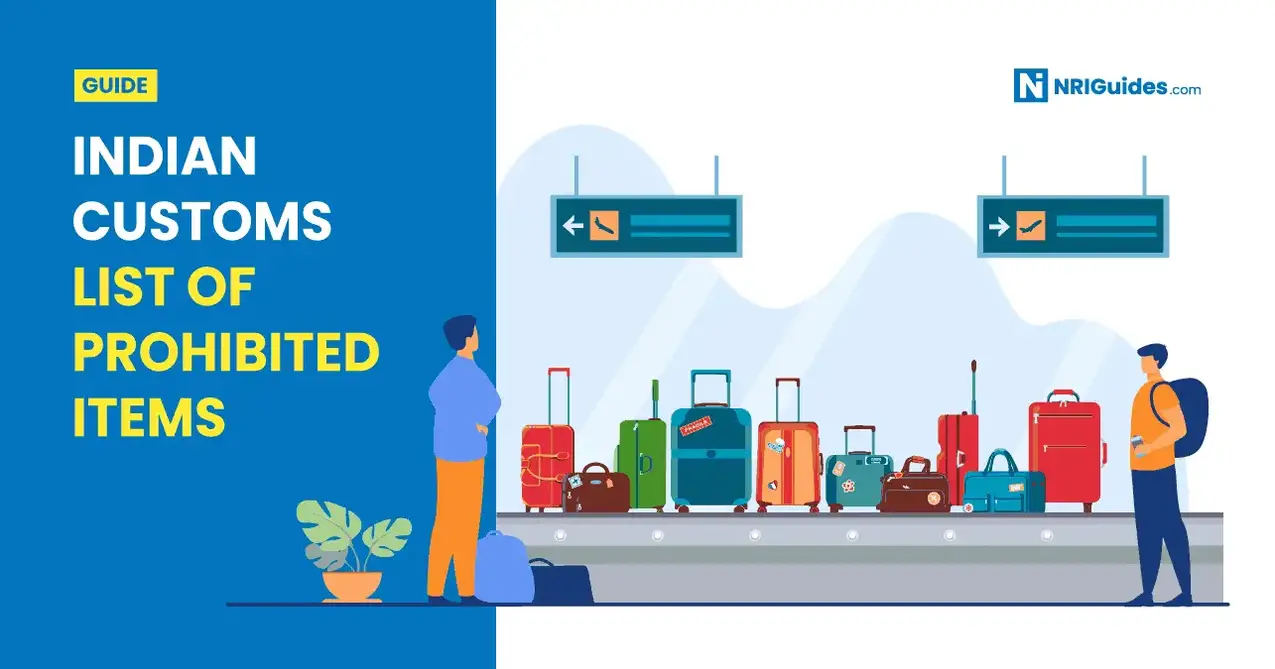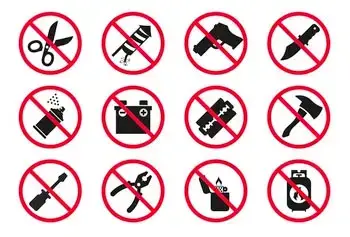

The NRI Guides Team regularly reviews this article to ensure the content is up-to-date and accurate. The last editorial review and update were on 25 October 2023.
Every country has their own Customs list of prohibited and restricted items, and India is no exception. There are many things that you cannot bring into the country, whether it’s due to concerns about security or simply because they are illegal.
It is the responsibility of Indian Customs to prevent the illegal import of prohibited items from entering the country. If you’re planning on travelling to India, make sure you familiarize yourself with the Indian Customs list of prohibited items so that you don’t end up having your belongings confiscated or worse, getting arrested.
Here is a breakdown of some of the most common items prohibited for air travellers to India.
The below information has been prepared after studying the Indian Baggage Rules and traveller guidelines issued by the Central Board of Indirect Customs and Taxes.
Prohibited goods are items that are legally banned for import to or export from a country. Examples include goods which may cause social, health, environmental, wildlife, or security problems.
CBIC has also listed the following items as Restricted Goods:
These goods can only be imported after obtaining special permits and paying Customs duty if applicable. There are also restrictions on the number of such goods.
Passengers who are moving permanently to India after a period of stay abroad are eligible to import some of these goods using the Transfer of Residence (TR) facility. You can read more about Transfer of Residence to India Customs Rules here.
Regular foods for personal consumption (in small quantities) are allowed for all passengers. However, you have to declare to Customs if you are bringing meat, meat products, dairy products, fish or poultry products.
At all Indian airports, there are two channels to choose from for customs clearance:
Please note that those who opt for the Green Channel with dutiable, restricted, or prohibited goods are subject to prosecution/penalties and confiscation.
If you have any dutiable or prohibited goods, you can make a declaration using the Indian Customs Declaration Form or the Atithi mobile app and go through the Red Channel. Even if you are not sure about any item, you can go to the Red Channel and seek assistance from an officer.

Apart from the items banned by Indian Customs, below are some items that are usually prohibited by airlines due to safety or security issues. If needed, you can check with your airline for confirmation:
Personal Items
Guns and Firearms
Tools
Flammable items
Disabling Chemicals and Other Dangerous Items
This is only an indicative list of items. Despite this, common sense should prevail in determining whether an object may be used as a weapon for interfering with civil aviation operations.
For the following items, please check directly with your airline:
Under the Customs Act of 1962, a non-declaration, misdeclaration, or concealment of imports is an offence punishable by confiscation, fine, penalty, or even prosecution.
If a passenger is caught with prohibited items, the goods will be confiscated and the passenger may face legal actions depending on the nature of the goods. These may include a fine, penalties on individuals or concerned entities, arrest and prosecution or even preventive detention in cases of grave violations.
Please note that ignorance of the law doesn’t immune you from the legal consequences.
However, if a passenger willingly declares an article which is dutiable or the import of which is prohibited, the Customs officer may detain that article for the purpose of being returned to the passenger on his leaving India.
If the passenger is not able to collect the article at the time of his leaving India, the article may be returned to him through any other passenger leaving India in his name or as cargo consigned in his name (Customs Act, 1962, Section 80)
Please remember that Customs officers in India have the authority to question you and examine your personal property. In the event that you are selected to be questioned/examined, you have the right to be treated politely, professionally and respectfully. At the same time, you are also responsible for cooperating with Customs officers in case of an examination.
If goods are confiscated, their ownership passes to the Government and Indian Customs is responsible for disposal.
No, the import of satellite phones is banned in India. Any individual found to be in possession of an unauthorized satellite phone in India is liable to be prosecuted and all unauthorized sets found will be seized.
Carriage of power banks as part of check-in baggage is strictly prohibited. However, the
same can be carried in hand baggage (cabin baggage).
Copyright © NRIGuides.com – Unauthorized reproduction of this article in any language is prohibited. The information provided on this website is intended for general guidance and informational purposes only. It should not be considered a substitute for professional advice, and travellers are encouraged to verify visa requirements and travel advisories through official government sources before making any travel arrangements.

Aneesh, the Founder & Editor of DG Pixels, holds a Master’s Degree in Communication & Journalism, and has two decades of experience living in the Middle East. Since 2014, he and his team have been sharing helpful content on travel, visa rules, and expatriate affairs.